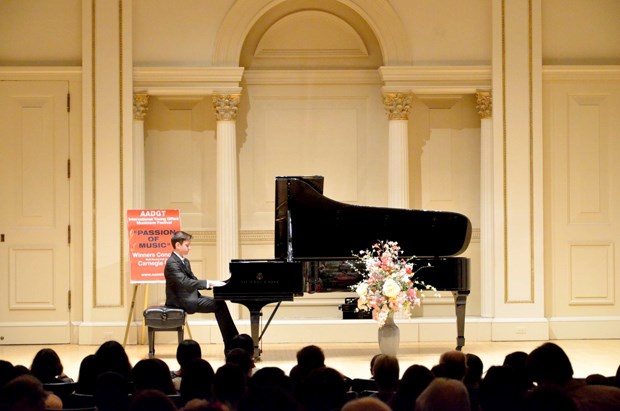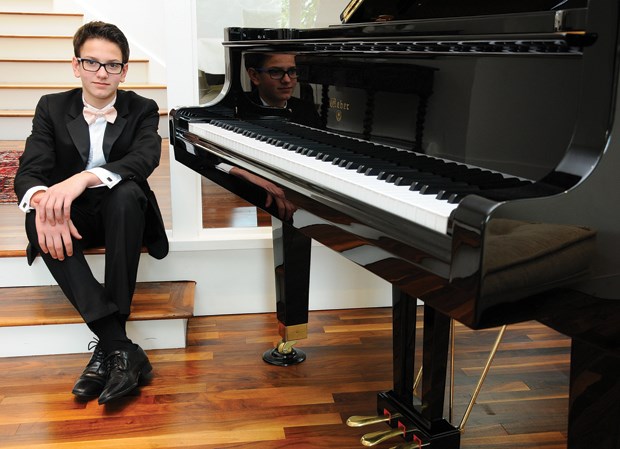Augustin Wright pauses when asked what he likes about playing music.
It’s a difficult question to answer, he admits. After some thought, though, one word emerges: emotion. He likes the emotion music can portray.
“It’s like another language almost,” he says.
Augustin has been playing piano since he was five years old and cello since he was six.
Now 13 (he will be 14 at the end of April), he is an accomplished performer in both and has won multiple scholarships and competitions. Most recently, his solo performance won silver at the International Passion for Music competition, and a gold for his performance with his chamber music trio. The prize was a trip to Carnegie Hall in New York to perform at a special concert on April 17. Augustin says he was pleased with the results and is looking forward to his next competition in May. Top prize for that one is a chance to play a concerto at the Orpheum Theatre.
“I really want to win that one,” says Augustin.
The West Vancouver teen has been training at Vancouver Academy of Music in Kitsilano since he started playing music, and now practices about one to four hours a day depending on his schedule. Over the March Break, he was preparing for the May competition and was in the studio rehearsing for up to 10 hours a day.
Augustin says he doesn’t get nervous before a performance.
“I don’t take matters too seriously,” he notes.
Have a quick chat with him about music, though, and you’ll soon realize he certainly takes his music seriously.
Augustin has a passion for music and for performing. He talks about the history of classical music and makes specific distinctions between the instruments used in the 1700s versus the 1800s. The romance era of classical music started around the year 1800, he explains, and that’s his favourite type of music from that era, with composers such as Mendelssohn, Chopin and Liszt among his top picks.
When he’s not studying the classics, Augustin listens to a wide range of music, including pop and even EDM. Anything on his playlist is fair game.
“I think it’s particularly bad to listen to only one type of music,” he explains. “Then you get all your knowledge about music from just one type of music.”
“It gives you the ability to be able to relate more,” he says of listening to more variety.
Learning to play two different instruments can be a challenge, but Augustin says he is glad he learned both piano and cello because it has given him more opportunities to play. Most orchestras don’t have a piano, but most do have a cello.
Although he enjoys both, he does have a favourite: “I think piano is more fun to play because piano really clicks with me and I learn pieces really fast, well pretty fast.”
But there are pros and cons for each instrument. There is more freedom for placement of fingers on a cello, which allows for semi-tones. Playing runs (fast notes up and down) is not too hard on a piano but is on a cello because there’s more movement involved. And playing the cello is more tiring because it involves a lot more shoulder movement and using two arms in different ways as opposed to two arms in the same way with the piano.
There’s a lot more co-ordination that has to happen with playing a cello. But cello music is easier to learn because there is only one line of music to learn, but a piano has two lines of music.
Augustin wants to be an orthodontist when he grows up, and he wants to attend a combined Julliard-Columbia post-secondary program in which he could earn a science degree and a master’s degree in music.
Although it has taken a lot of hard work to get to where he is today with his music, Augustin thinks anyone can learn to play an instrument.
“Anybody can try anything. You always start by trying.”
This story originally appeared in print as part of a special advertising feature of the North Shore News that focuses on activites for kids.




